BMA6115 Leadership: Reflective Analysis on Transformational Leadership
VerifiedAdded on 2023/06/11
|7
|2101
|342
Report
AI Summary
This report reflects on the author's experience with transformational leadership, particularly in the context of the hospitality industry before and during the COVID-19 pandemic. The reflection utilizes Gibbs' Reflective Cycle, encompassing description, feelings, evaluation, analysis, conclusion, and action plan. It highlights the shift in leadership approaches needed during turbulent times, emphasizing the importance of talent redistribution, embracing technology, and fostering a culture of innovation and adaptability. The report analyzes how pre-pandemic strategies evolved, the significance of bionic cost structures, and the necessity for leaders to enable rather than manage. Key takeaways include the need for companies to fail fast and scale fast, promoting employee potential, and adapting to remote work environments. Ultimately, the reflection underscores the critical role of transformational leadership in navigating organizational challenges and achieving success in a rapidly changing world. Desklib provides this assignment as a learning resource, offering access to similar solved assignments and past papers.
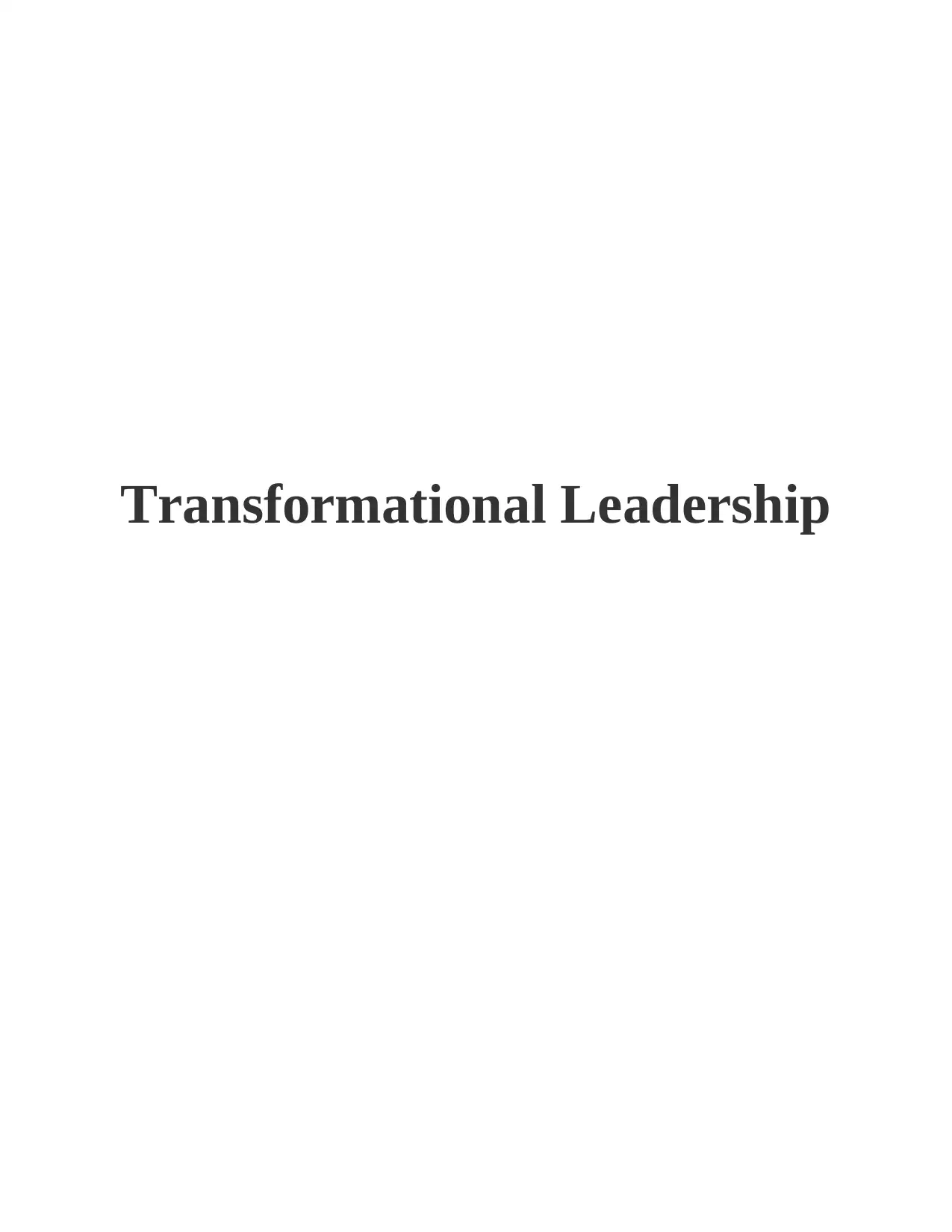
Transformational Leadership
Paraphrase This Document
Need a fresh take? Get an instant paraphrase of this document with our AI Paraphraser
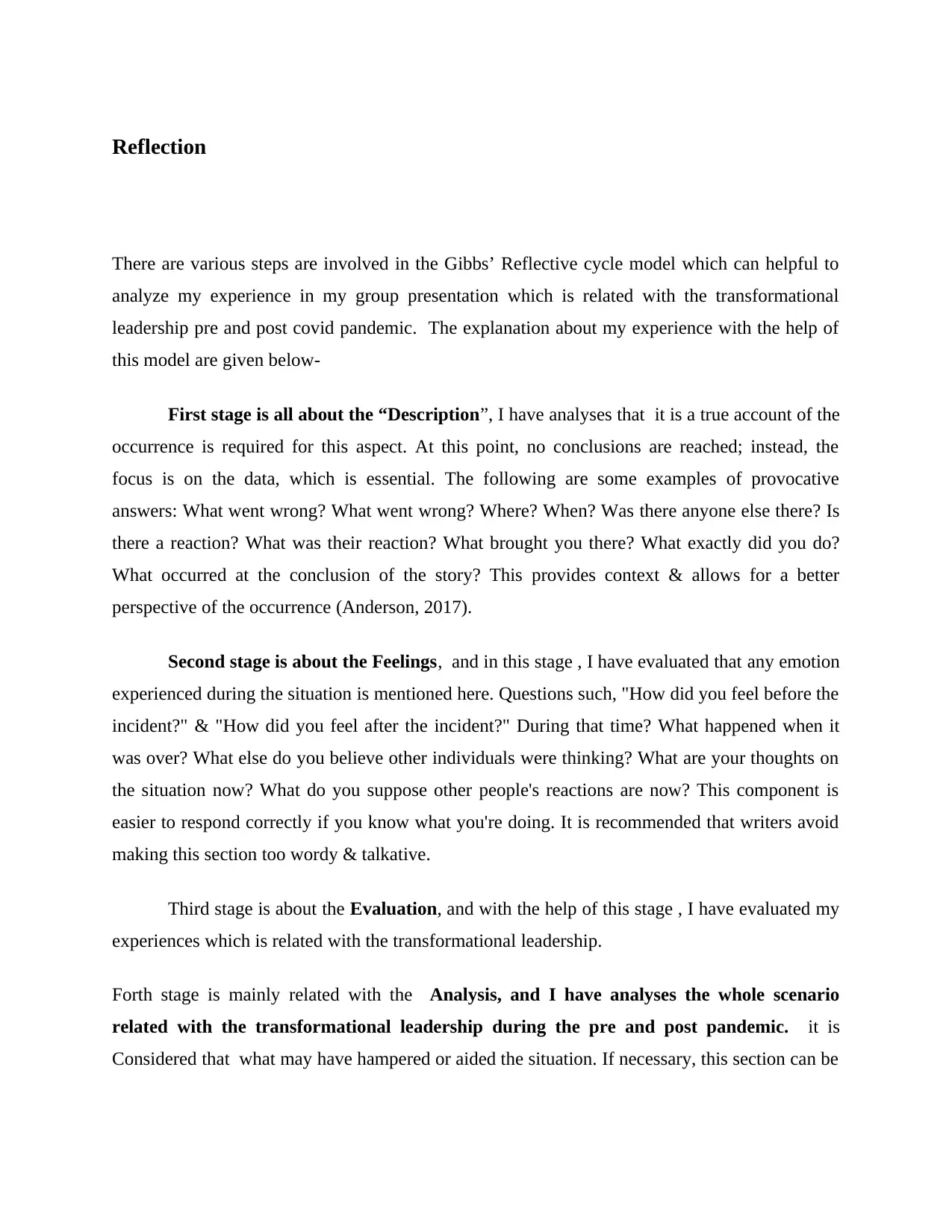
Reflection
There are various steps are involved in the Gibbs’ Reflective cycle model which can helpful to
analyze my experience in my group presentation which is related with the transformational
leadership pre and post covid pandemic. The explanation about my experience with the help of
this model are given below-
First stage is all about the “Description”, I have analyses that it is a true account of the
occurrence is required for this aspect. At this point, no conclusions are reached; instead, the
focus is on the data, which is essential. The following are some examples of provocative
answers: What went wrong? What went wrong? Where? When? Was there anyone else there? Is
there a reaction? What was their reaction? What brought you there? What exactly did you do?
What occurred at the conclusion of the story? This provides context & allows for a better
perspective of the occurrence (Anderson, 2017).
Second stage is about the Feelings, and in this stage , I have evaluated that any emotion
experienced during the situation is mentioned here. Questions such, "How did you feel before the
incident?" & "How did you feel after the incident?" During that time? What happened when it
was over? What else do you believe other individuals were thinking? What are your thoughts on
the situation now? What do you suppose other people's reactions are now? This component is
easier to respond correctly if you know what you're doing. It is recommended that writers avoid
making this section too wordy & talkative.
Third stage is about the Evaluation, and with the help of this stage , I have evaluated my
experiences which is related with the transformational leadership.
Forth stage is mainly related with the Analysis, and I have analyses the whole scenario
related with the transformational leadership during the pre and post pandemic. it is
Considered that what may have hampered or aided the situation. If necessary, this section can be
There are various steps are involved in the Gibbs’ Reflective cycle model which can helpful to
analyze my experience in my group presentation which is related with the transformational
leadership pre and post covid pandemic. The explanation about my experience with the help of
this model are given below-
First stage is all about the “Description”, I have analyses that it is a true account of the
occurrence is required for this aspect. At this point, no conclusions are reached; instead, the
focus is on the data, which is essential. The following are some examples of provocative
answers: What went wrong? What went wrong? Where? When? Was there anyone else there? Is
there a reaction? What was their reaction? What brought you there? What exactly did you do?
What occurred at the conclusion of the story? This provides context & allows for a better
perspective of the occurrence (Anderson, 2017).
Second stage is about the Feelings, and in this stage , I have evaluated that any emotion
experienced during the situation is mentioned here. Questions such, "How did you feel before the
incident?" & "How did you feel after the incident?" During that time? What happened when it
was over? What else do you believe other individuals were thinking? What are your thoughts on
the situation now? What do you suppose other people's reactions are now? This component is
easier to respond correctly if you know what you're doing. It is recommended that writers avoid
making this section too wordy & talkative.
Third stage is about the Evaluation, and with the help of this stage , I have evaluated my
experiences which is related with the transformational leadership.
Forth stage is mainly related with the Analysis, and I have analyses the whole scenario
related with the transformational leadership during the pre and post pandemic. it is
Considered that what may have hampered or aided the situation. If necessary, this section can be
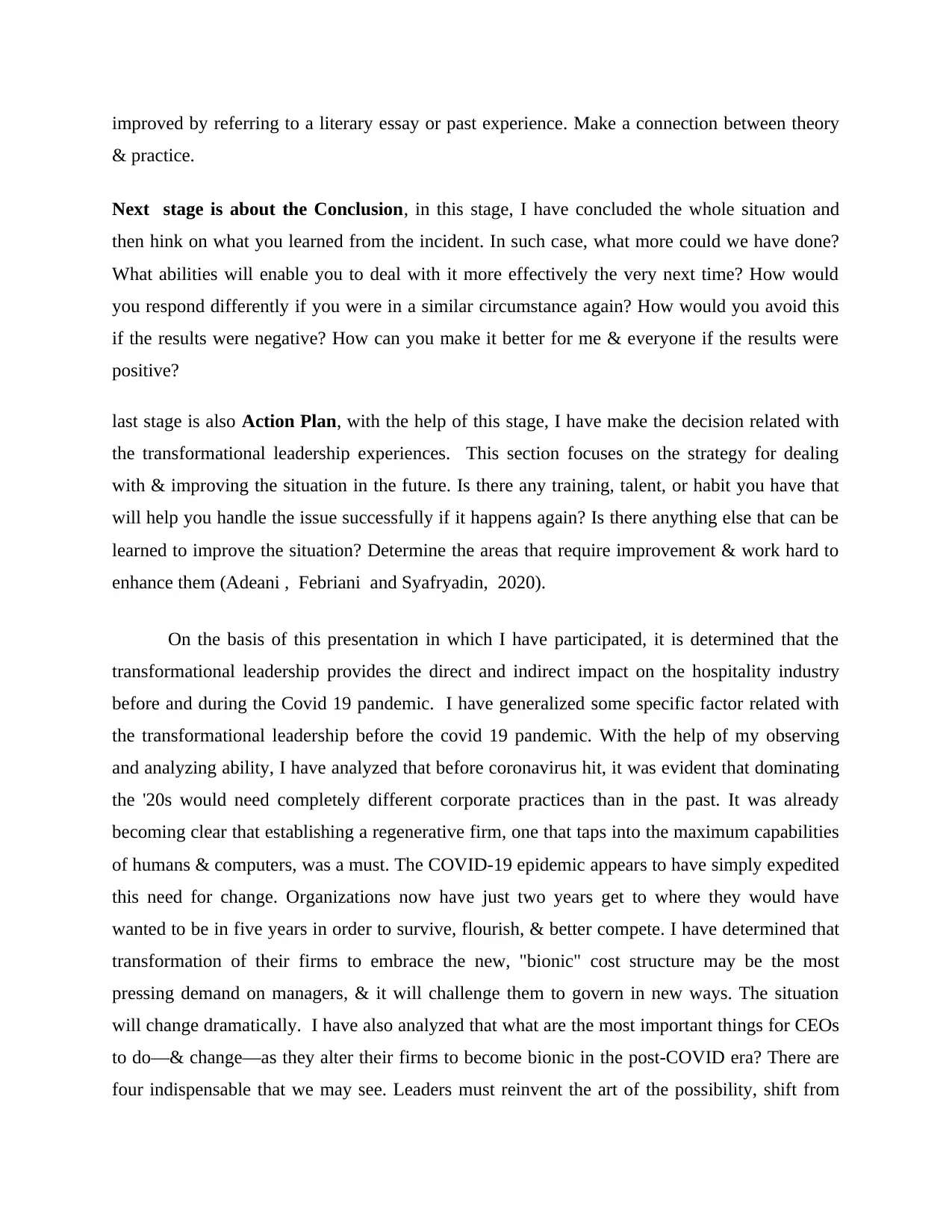
improved by referring to a literary essay or past experience. Make a connection between theory
& practice.
Next stage is about the Conclusion, in this stage, I have concluded the whole situation and
then hink on what you learned from the incident. In such case, what more could we have done?
What abilities will enable you to deal with it more effectively the very next time? How would
you respond differently if you were in a similar circumstance again? How would you avoid this
if the results were negative? How can you make it better for me & everyone if the results were
positive?
last stage is also Action Plan, with the help of this stage, I have make the decision related with
the transformational leadership experiences. This section focuses on the strategy for dealing
with & improving the situation in the future. Is there any training, talent, or habit you have that
will help you handle the issue successfully if it happens again? Is there anything else that can be
learned to improve the situation? Determine the areas that require improvement & work hard to
enhance them (Adeani , Febriani and Syafryadin, 2020).
On the basis of this presentation in which I have participated, it is determined that the
transformational leadership provides the direct and indirect impact on the hospitality industry
before and during the Covid 19 pandemic. I have generalized some specific factor related with
the transformational leadership before the covid 19 pandemic. With the help of my observing
and analyzing ability, I have analyzed that before coronavirus hit, it was evident that dominating
the '20s would need completely different corporate practices than in the past. It was already
becoming clear that establishing a regenerative firm, one that taps into the maximum capabilities
of humans & computers, was a must. The COVID-19 epidemic appears to have simply expedited
this need for change. Organizations now have just two years get to where they would have
wanted to be in five years in order to survive, flourish, & better compete. I have determined that
transformation of their firms to embrace the new, "bionic" cost structure may be the most
pressing demand on managers, & it will challenge them to govern in new ways. The situation
will change dramatically. I have also analyzed that what are the most important things for CEOs
to do—& change—as they alter their firms to become bionic in the post-COVID era? There are
four indispensable that we may see. Leaders must reinvent the art of the possibility, shift from
& practice.
Next stage is about the Conclusion, in this stage, I have concluded the whole situation and
then hink on what you learned from the incident. In such case, what more could we have done?
What abilities will enable you to deal with it more effectively the very next time? How would
you respond differently if you were in a similar circumstance again? How would you avoid this
if the results were negative? How can you make it better for me & everyone if the results were
positive?
last stage is also Action Plan, with the help of this stage, I have make the decision related with
the transformational leadership experiences. This section focuses on the strategy for dealing
with & improving the situation in the future. Is there any training, talent, or habit you have that
will help you handle the issue successfully if it happens again? Is there anything else that can be
learned to improve the situation? Determine the areas that require improvement & work hard to
enhance them (Adeani , Febriani and Syafryadin, 2020).
On the basis of this presentation in which I have participated, it is determined that the
transformational leadership provides the direct and indirect impact on the hospitality industry
before and during the Covid 19 pandemic. I have generalized some specific factor related with
the transformational leadership before the covid 19 pandemic. With the help of my observing
and analyzing ability, I have analyzed that before coronavirus hit, it was evident that dominating
the '20s would need completely different corporate practices than in the past. It was already
becoming clear that establishing a regenerative firm, one that taps into the maximum capabilities
of humans & computers, was a must. The COVID-19 epidemic appears to have simply expedited
this need for change. Organizations now have just two years get to where they would have
wanted to be in five years in order to survive, flourish, & better compete. I have determined that
transformation of their firms to embrace the new, "bionic" cost structure may be the most
pressing demand on managers, & it will challenge them to govern in new ways. The situation
will change dramatically. I have also analyzed that what are the most important things for CEOs
to do—& change—as they alter their firms to become bionic in the post-COVID era? There are
four indispensable that we may see. Leaders must reinvent the art of the possibility, shift from
⊘ This is a preview!⊘
Do you want full access?
Subscribe today to unlock all pages.

Trusted by 1+ million students worldwide
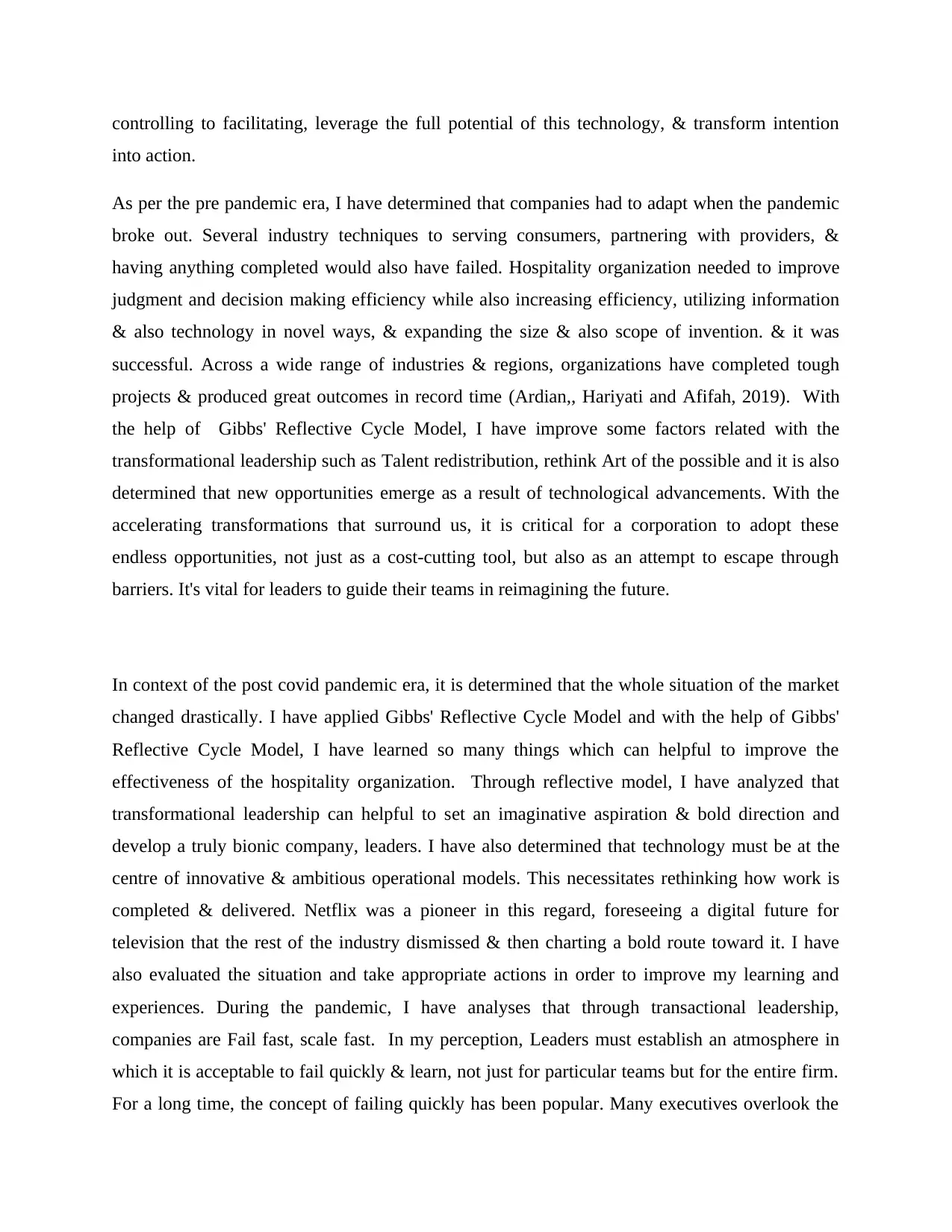
controlling to facilitating, leverage the full potential of this technology, & transform intention
into action.
As per the pre pandemic era, I have determined that companies had to adapt when the pandemic
broke out. Several industry techniques to serving consumers, partnering with providers, &
having anything completed would also have failed. Hospitality organization needed to improve
judgment and decision making efficiency while also increasing efficiency, utilizing information
& also technology in novel ways, & expanding the size & also scope of invention. & it was
successful. Across a wide range of industries & regions, organizations have completed tough
projects & produced great outcomes in record time (Ardian,, Hariyati and Afifah, 2019). With
the help of Gibbs' Reflective Cycle Model, I have improve some factors related with the
transformational leadership such as Talent redistribution, rethink Art of the possible and it is also
determined that new opportunities emerge as a result of technological advancements. With the
accelerating transformations that surround us, it is critical for a corporation to adopt these
endless opportunities, not just as a cost-cutting tool, but also as an attempt to escape through
barriers. It's vital for leaders to guide their teams in reimagining the future.
In context of the post covid pandemic era, it is determined that the whole situation of the market
changed drastically. I have applied Gibbs' Reflective Cycle Model and with the help of Gibbs'
Reflective Cycle Model, I have learned so many things which can helpful to improve the
effectiveness of the hospitality organization. Through reflective model, I have analyzed that
transformational leadership can helpful to set an imaginative aspiration & bold direction and
develop a truly bionic company, leaders. I have also determined that technology must be at the
centre of innovative & ambitious operational models. This necessitates rethinking how work is
completed & delivered. Netflix was a pioneer in this regard, foreseeing a digital future for
television that the rest of the industry dismissed & then charting a bold route toward it. I have
also evaluated the situation and take appropriate actions in order to improve my learning and
experiences. During the pandemic, I have analyses that through transactional leadership,
companies are Fail fast, scale fast. In my perception, Leaders must establish an atmosphere in
which it is acceptable to fail quickly & learn, not just for particular teams but for the entire firm.
For a long time, the concept of failing quickly has been popular. Many executives overlook the
into action.
As per the pre pandemic era, I have determined that companies had to adapt when the pandemic
broke out. Several industry techniques to serving consumers, partnering with providers, &
having anything completed would also have failed. Hospitality organization needed to improve
judgment and decision making efficiency while also increasing efficiency, utilizing information
& also technology in novel ways, & expanding the size & also scope of invention. & it was
successful. Across a wide range of industries & regions, organizations have completed tough
projects & produced great outcomes in record time (Ardian,, Hariyati and Afifah, 2019). With
the help of Gibbs' Reflective Cycle Model, I have improve some factors related with the
transformational leadership such as Talent redistribution, rethink Art of the possible and it is also
determined that new opportunities emerge as a result of technological advancements. With the
accelerating transformations that surround us, it is critical for a corporation to adopt these
endless opportunities, not just as a cost-cutting tool, but also as an attempt to escape through
barriers. It's vital for leaders to guide their teams in reimagining the future.
In context of the post covid pandemic era, it is determined that the whole situation of the market
changed drastically. I have applied Gibbs' Reflective Cycle Model and with the help of Gibbs'
Reflective Cycle Model, I have learned so many things which can helpful to improve the
effectiveness of the hospitality organization. Through reflective model, I have analyzed that
transformational leadership can helpful to set an imaginative aspiration & bold direction and
develop a truly bionic company, leaders. I have also determined that technology must be at the
centre of innovative & ambitious operational models. This necessitates rethinking how work is
completed & delivered. Netflix was a pioneer in this regard, foreseeing a digital future for
television that the rest of the industry dismissed & then charting a bold route toward it. I have
also evaluated the situation and take appropriate actions in order to improve my learning and
experiences. During the pandemic, I have analyses that through transactional leadership,
companies are Fail fast, scale fast. In my perception, Leaders must establish an atmosphere in
which it is acceptable to fail quickly & learn, not just for particular teams but for the entire firm.
For a long time, the concept of failing quickly has been popular. Many executives overlook the
Paraphrase This Document
Need a fresh take? Get an instant paraphrase of this document with our AI Paraphraser
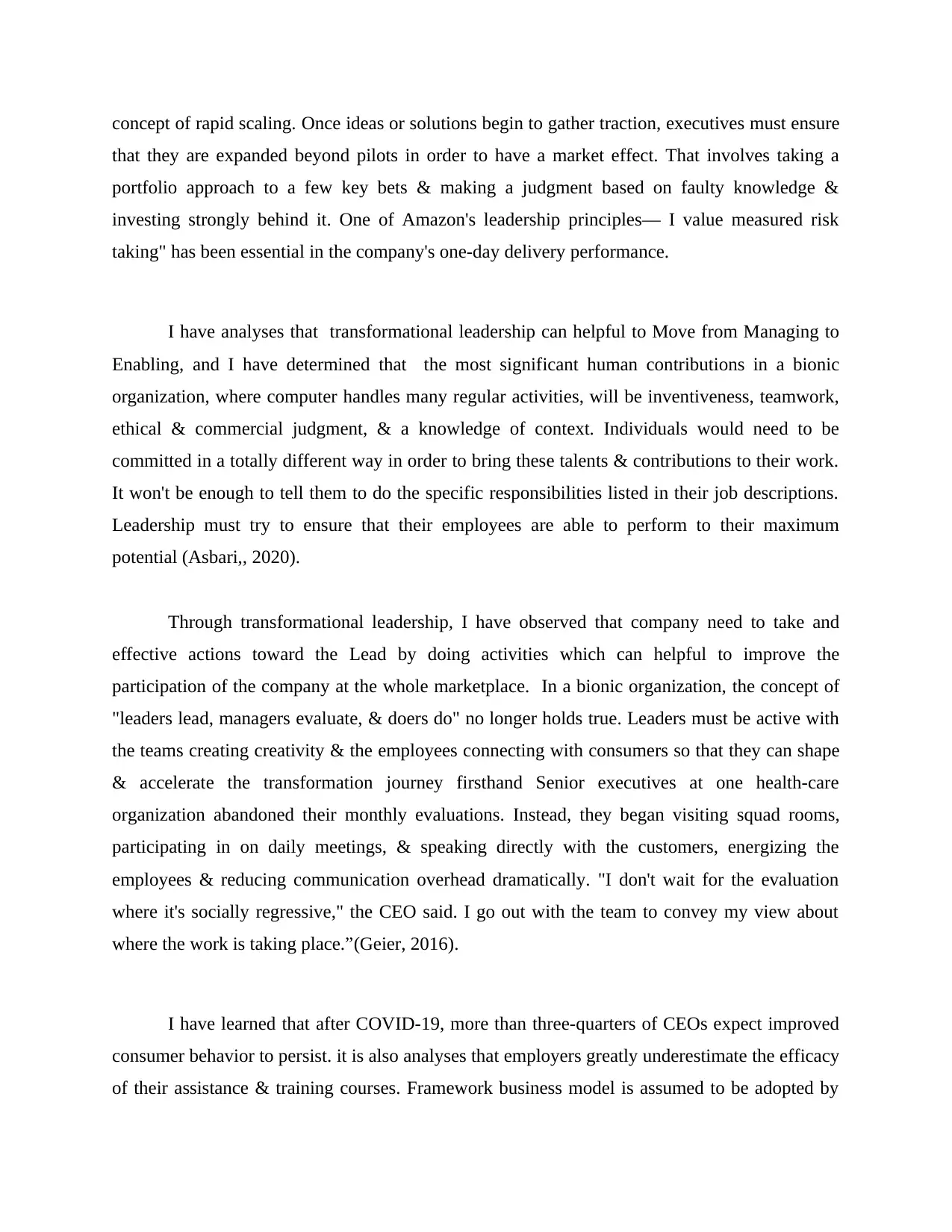
concept of rapid scaling. Once ideas or solutions begin to gather traction, executives must ensure
that they are expanded beyond pilots in order to have a market effect. That involves taking a
portfolio approach to a few key bets & making a judgment based on faulty knowledge &
investing strongly behind it. One of Amazon's leadership principles— I value measured risk
taking" has been essential in the company's one-day delivery performance.
I have analyses that transformational leadership can helpful to Move from Managing to
Enabling, and I have determined that the most significant human contributions in a bionic
organization, where computer handles many regular activities, will be inventiveness, teamwork,
ethical & commercial judgment, & a knowledge of context. Individuals would need to be
committed in a totally different way in order to bring these talents & contributions to their work.
It won't be enough to tell them to do the specific responsibilities listed in their job descriptions.
Leadership must try to ensure that their employees are able to perform to their maximum
potential (Asbari,, 2020).
Through transformational leadership, I have observed that company need to take and
effective actions toward the Lead by doing activities which can helpful to improve the
participation of the company at the whole marketplace. In a bionic organization, the concept of
"leaders lead, managers evaluate, & doers do" no longer holds true. Leaders must be active with
the teams creating creativity & the employees connecting with consumers so that they can shape
& accelerate the transformation journey firsthand Senior executives at one health-care
organization abandoned their monthly evaluations. Instead, they began visiting squad rooms,
participating in on daily meetings, & speaking directly with the customers, energizing the
employees & reducing communication overhead dramatically. "I don't wait for the evaluation
where it's socially regressive," the CEO said. I go out with the team to convey my view about
where the work is taking place.”(Geier, 2016).
I have learned that after COVID-19, more than three-quarters of CEOs expect improved
consumer behavior to persist. it is also analyses that employers greatly underestimate the efficacy
of their assistance & training courses. Framework business model is assumed to be adopted by
that they are expanded beyond pilots in order to have a market effect. That involves taking a
portfolio approach to a few key bets & making a judgment based on faulty knowledge &
investing strongly behind it. One of Amazon's leadership principles— I value measured risk
taking" has been essential in the company's one-day delivery performance.
I have analyses that transformational leadership can helpful to Move from Managing to
Enabling, and I have determined that the most significant human contributions in a bionic
organization, where computer handles many regular activities, will be inventiveness, teamwork,
ethical & commercial judgment, & a knowledge of context. Individuals would need to be
committed in a totally different way in order to bring these talents & contributions to their work.
It won't be enough to tell them to do the specific responsibilities listed in their job descriptions.
Leadership must try to ensure that their employees are able to perform to their maximum
potential (Asbari,, 2020).
Through transformational leadership, I have observed that company need to take and
effective actions toward the Lead by doing activities which can helpful to improve the
participation of the company at the whole marketplace. In a bionic organization, the concept of
"leaders lead, managers evaluate, & doers do" no longer holds true. Leaders must be active with
the teams creating creativity & the employees connecting with consumers so that they can shape
& accelerate the transformation journey firsthand Senior executives at one health-care
organization abandoned their monthly evaluations. Instead, they began visiting squad rooms,
participating in on daily meetings, & speaking directly with the customers, energizing the
employees & reducing communication overhead dramatically. "I don't wait for the evaluation
where it's socially regressive," the CEO said. I go out with the team to convey my view about
where the work is taking place.”(Geier, 2016).
I have learned that after COVID-19, more than three-quarters of CEOs expect improved
consumer behavior to persist. it is also analyses that employers greatly underestimate the efficacy
of their assistance & training courses. Framework business model is assumed to be adopted by
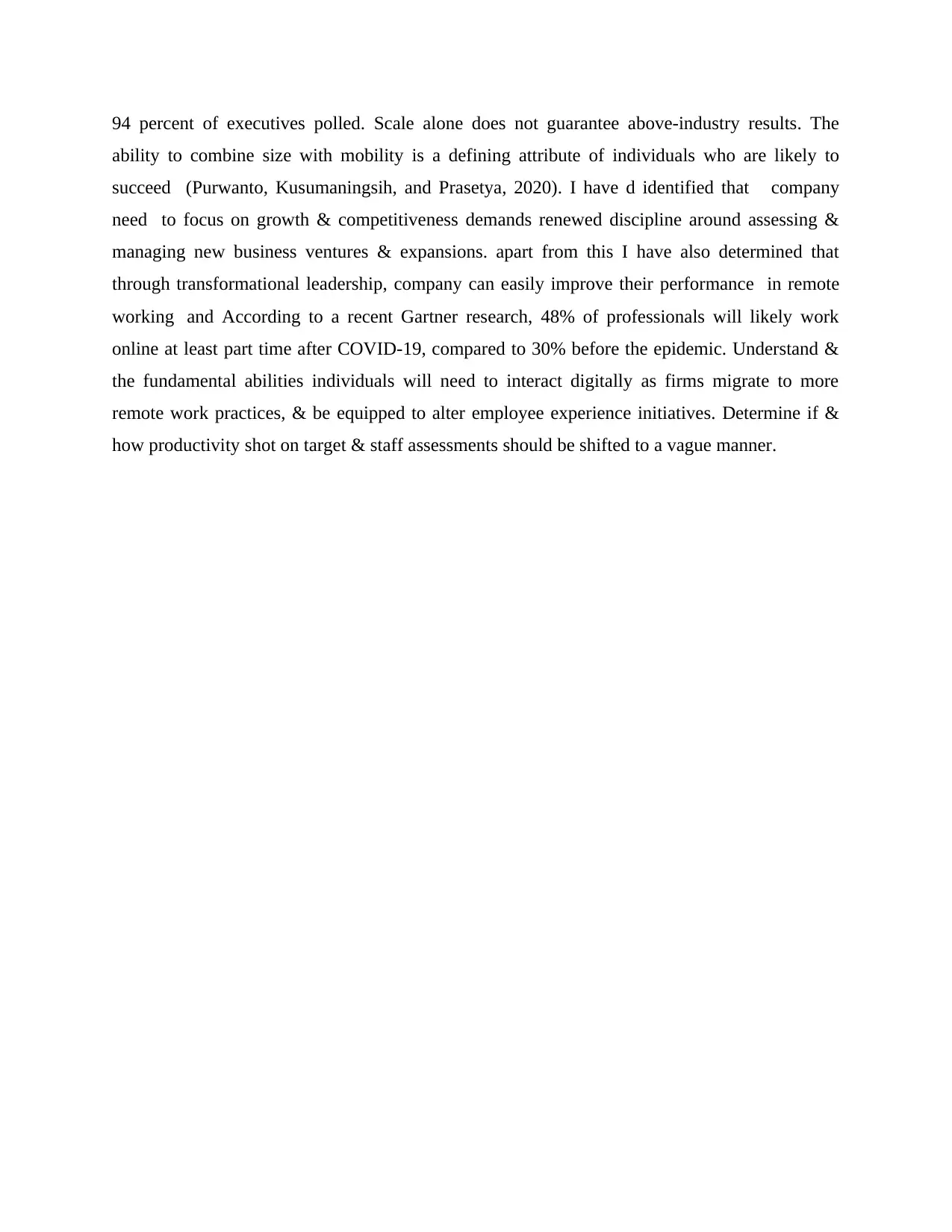
94 percent of executives polled. Scale alone does not guarantee above-industry results. The
ability to combine size with mobility is a defining attribute of individuals who are likely to
succeed (Purwanto, Kusumaningsih, and Prasetya, 2020). I have d identified that company
need to focus on growth & competitiveness demands renewed discipline around assessing &
managing new business ventures & expansions. apart from this I have also determined that
through transformational leadership, company can easily improve their performance in remote
working and According to a recent Gartner research, 48% of professionals will likely work
online at least part time after COVID-19, compared to 30% before the epidemic. Understand &
the fundamental abilities individuals will need to interact digitally as firms migrate to more
remote work practices, & be equipped to alter employee experience initiatives. Determine if &
how productivity shot on target & staff assessments should be shifted to a vague manner.
ability to combine size with mobility is a defining attribute of individuals who are likely to
succeed (Purwanto, Kusumaningsih, and Prasetya, 2020). I have d identified that company
need to focus on growth & competitiveness demands renewed discipline around assessing &
managing new business ventures & expansions. apart from this I have also determined that
through transformational leadership, company can easily improve their performance in remote
working and According to a recent Gartner research, 48% of professionals will likely work
online at least part time after COVID-19, compared to 30% before the epidemic. Understand &
the fundamental abilities individuals will need to interact digitally as firms migrate to more
remote work practices, & be equipped to alter employee experience initiatives. Determine if &
how productivity shot on target & staff assessments should be shifted to a vague manner.
⊘ This is a preview!⊘
Do you want full access?
Subscribe today to unlock all pages.

Trusted by 1+ million students worldwide
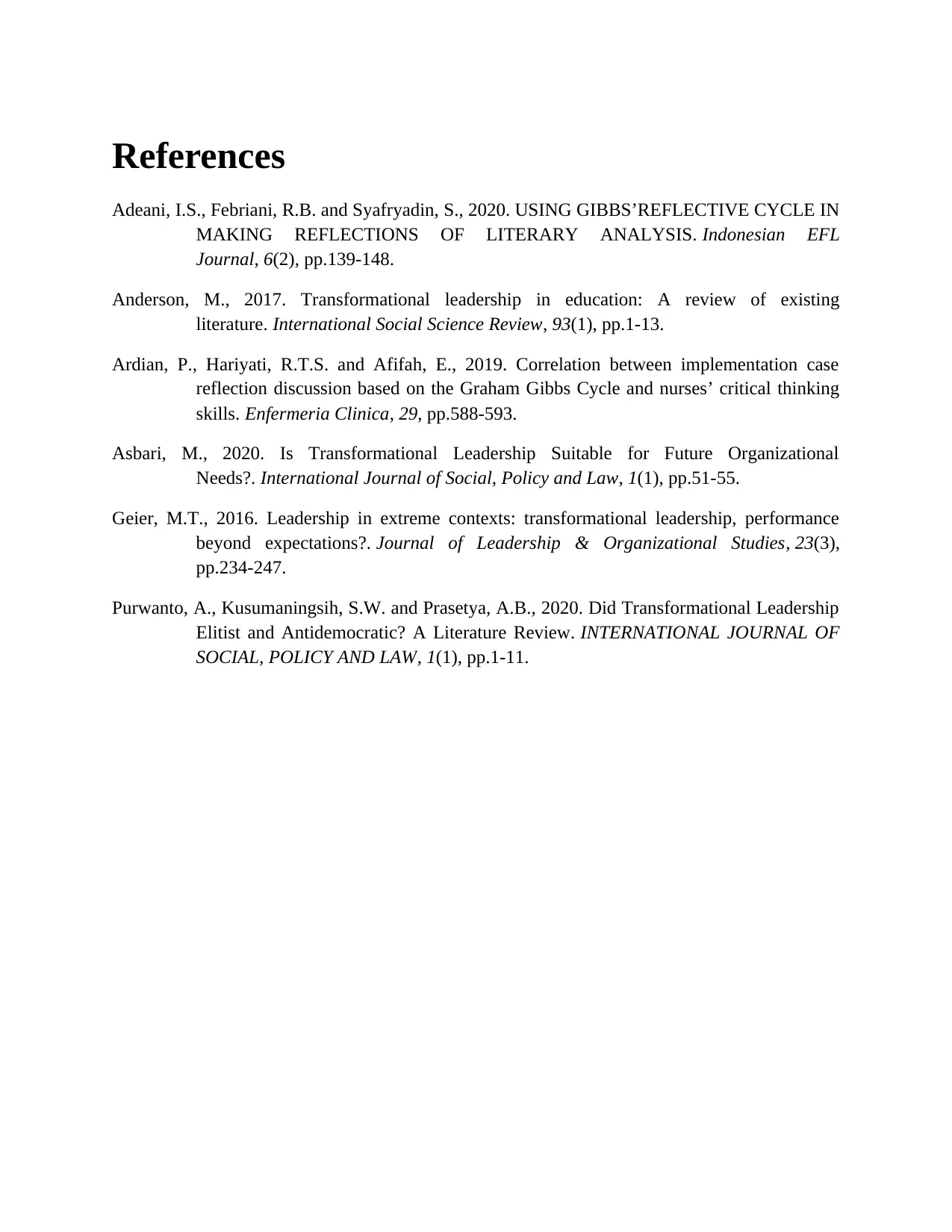
References
Adeani, I.S., Febriani, R.B. and Syafryadin, S., 2020. USING GIBBS’REFLECTIVE CYCLE IN
MAKING REFLECTIONS OF LITERARY ANALYSIS. Indonesian EFL
Journal, 6(2), pp.139-148.
Anderson, M., 2017. Transformational leadership in education: A review of existing
literature. International Social Science Review, 93(1), pp.1-13.
Ardian, P., Hariyati, R.T.S. and Afifah, E., 2019. Correlation between implementation case
reflection discussion based on the Graham Gibbs Cycle and nurses’ critical thinking
skills. Enfermeria Clinica, 29, pp.588-593.
Asbari, M., 2020. Is Transformational Leadership Suitable for Future Organizational
Needs?. International Journal of Social, Policy and Law, 1(1), pp.51-55.
Geier, M.T., 2016. Leadership in extreme contexts: transformational leadership, performance
beyond expectations?. Journal of Leadership & Organizational Studies, 23(3),
pp.234-247.
Purwanto, A., Kusumaningsih, S.W. and Prasetya, A.B., 2020. Did Transformational Leadership
Elitist and Antidemocratic? A Literature Review. INTERNATIONAL JOURNAL OF
SOCIAL, POLICY AND LAW, 1(1), pp.1-11.
Adeani, I.S., Febriani, R.B. and Syafryadin, S., 2020. USING GIBBS’REFLECTIVE CYCLE IN
MAKING REFLECTIONS OF LITERARY ANALYSIS. Indonesian EFL
Journal, 6(2), pp.139-148.
Anderson, M., 2017. Transformational leadership in education: A review of existing
literature. International Social Science Review, 93(1), pp.1-13.
Ardian, P., Hariyati, R.T.S. and Afifah, E., 2019. Correlation between implementation case
reflection discussion based on the Graham Gibbs Cycle and nurses’ critical thinking
skills. Enfermeria Clinica, 29, pp.588-593.
Asbari, M., 2020. Is Transformational Leadership Suitable for Future Organizational
Needs?. International Journal of Social, Policy and Law, 1(1), pp.51-55.
Geier, M.T., 2016. Leadership in extreme contexts: transformational leadership, performance
beyond expectations?. Journal of Leadership & Organizational Studies, 23(3),
pp.234-247.
Purwanto, A., Kusumaningsih, S.W. and Prasetya, A.B., 2020. Did Transformational Leadership
Elitist and Antidemocratic? A Literature Review. INTERNATIONAL JOURNAL OF
SOCIAL, POLICY AND LAW, 1(1), pp.1-11.
1 out of 7
Related Documents
Your All-in-One AI-Powered Toolkit for Academic Success.
+13062052269
info@desklib.com
Available 24*7 on WhatsApp / Email
![[object Object]](/_next/static/media/star-bottom.7253800d.svg)
Unlock your academic potential
Copyright © 2020–2026 A2Z Services. All Rights Reserved. Developed and managed by ZUCOL.





